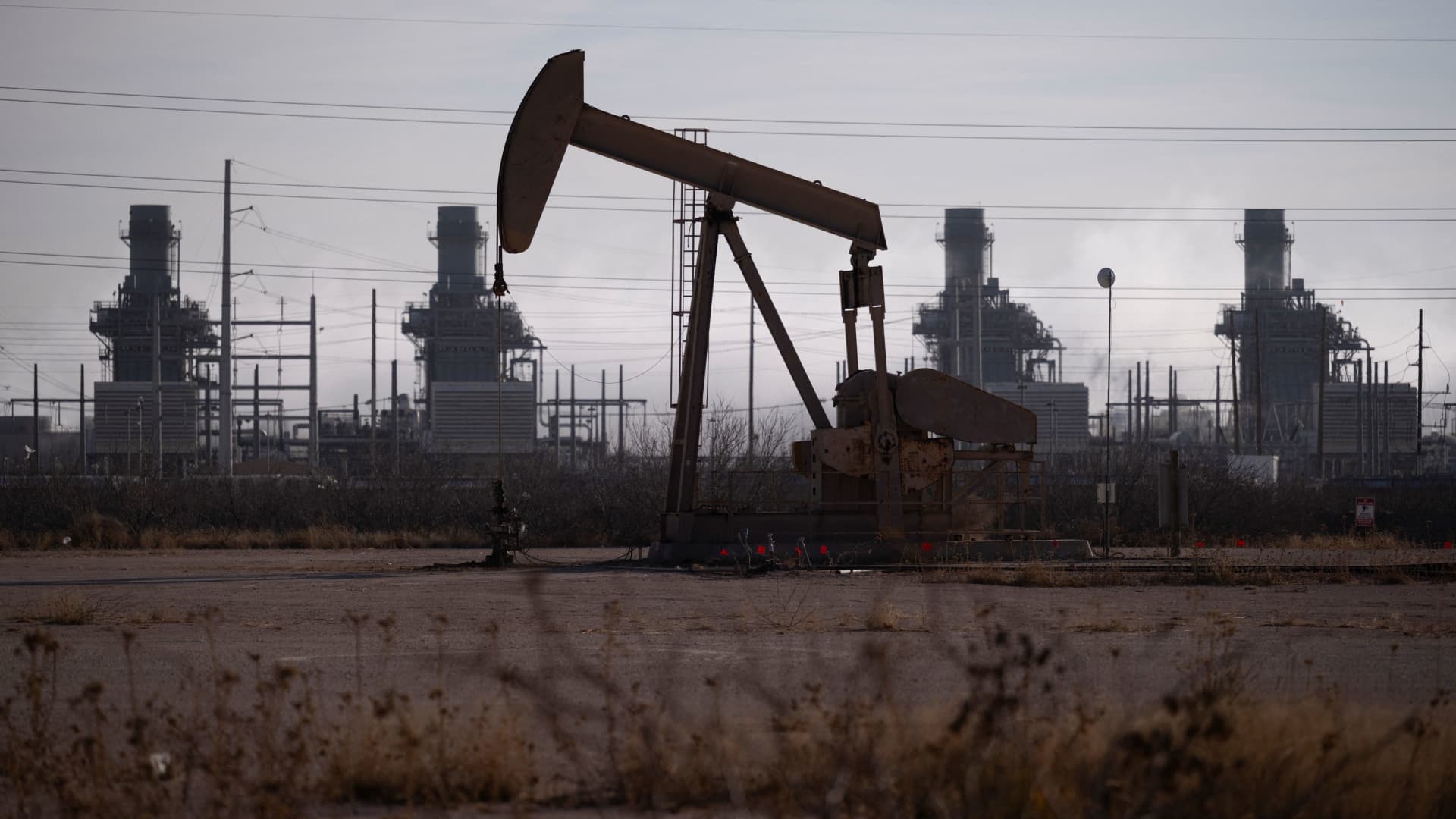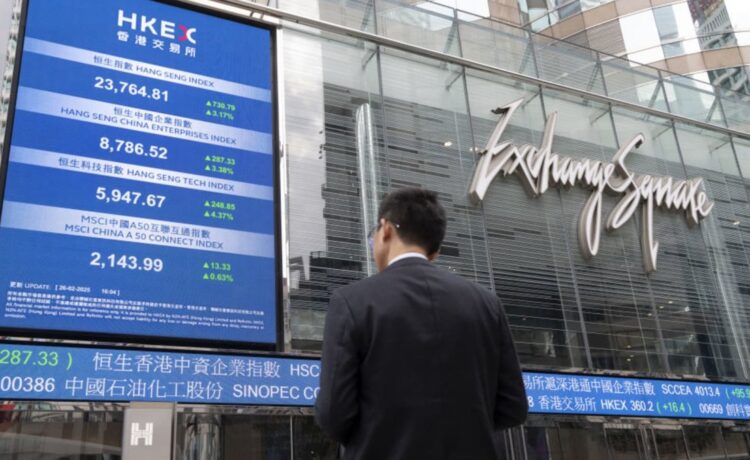This is CNBC’s live blog covering Asia-Pacific markets.
Asia-Pacific markets opened higher Tuesday, rebounding from previous session’s losses over U.S. President Donald Trump’s tariff policy and threats of even higher levies against China.
Australia’s S&P/ASX 200 added 0.18% at the open.
Japan’s Nikkei 225 rose 5.34% while the Topix gained 5.53%. South Korea’s Kospi rose 2.26% while the small-cap Kosdaq climbed 2.35%.
Hong Kong’s Hang Seng index futures were at 19,653, weaker than the HSI’s last close of 19,828.3.
Focus will be on Chinese stocks after Trump on Monday threatened additional 50% tariffs on China if Beijing did not lift its duties on U.S. imports. Hong Kong’s stock market led losses in the region on Monday, plummeting over 13% to log its steepest one-day decline since 1997, data from FactSet showed.
Trump stuck to his aggressive global tariffs strategy over the weekend, with an initial unilateral 10% tariff going into effect Saturday. Wall Street had been hoping for signs of progress in negotiations between the U.S. and other countries, with the ‘reciprocal’ tariffs set to begin on April 9.
“Asian equities suffered their worst rout in years, plunging to multi-year lows in a day marked by panic and uncertainty,” said Murthy Grandhi, company profiles analyst at data and analytics firm GlobalData.
“The renewed trade war fears have reignited concerns of a global economic slowdown, shattering already fragile investor confidence,” he said, adding that the path forward hinges on policy clarity and diplomatic engagement.
U.S. stock futures rose after the S&P 500 extended its losses for a third day following Trump’s tariffs announcement. Futures tied to the S&P 500 were about 1% higher, while Nasdaq-100 futures gained 1.1%. Futures linked to the Dow Jones Industrial Average jumped 476 points, or 1.2%.
Overnight in the U.S., the three major averages closed lower. The Dow Jones Industrial Average fell for a third day following President Donald Trump’s tariff rollout, dropping 0.91% to close at 37,965.60. The Nasdaq Composite inched higher by 0.10% to settle at 15,603.26. The S&P 500 shed 0.23% to end at 5,062.25.
— CNBC’s John Melloy, Hakyung Kim and Tanaya Macheel contributed to this report.
Samsung shares up 3% after Q1 estimated profits beat expectations
Shares of Samsung Electronics were up about 3% in early trading at 54,500 Korean won ($37.08) after the South Korean technology giant said it forecasts better-than-expected profit for the first-quarter.
According to an earnings guidance Tuesday, Samsung estimated its operating income for the first quarter to reach 6.6 trillion Korean won ($4.5 billion), beating estimates by economists polled by Reuters.
The operating profit guidance for the first quarter was down 0.2% from the same period last year. Meanwhile, first-quarter revenue is expected to have jumped 9.8% to approximately 79 trillion won.
The results come as the company faces threats from the U.S. President Donald Trump’s recently announced tariffs which could affect its semiconductor and smartphone businesses.
— Dylan Butts
Aberdeen watchful of opportunities for ‘bottom fishing’ across Asian equity markets
Aberdeen is keeping an eye on any areas for “bottom fishing” in the Asian equity markets amid increasing uncertainty. Bottom fishing is the practice of investing in financial assets that saw a significant decline in prices, and are often considered to be undervalued.
“We are watchful of opportunities for bottom fishing across Asian equity markets, although we are mindful of the growth exposures in our regional portfolios, and we are thinking through the potential winners and losers from the tariffs and any monetary policy adjustments that might follow,” Aberdeen Investments’ Deputy Head of APAC equities Pruksa Iamthongthong and her team told CNBC.
Looking ahead, Iamthongthong noted that Asian corporates still remain in “good shape” with low debt levels and strong competitive positions.
—Lee Ying Shan
U.S. crude oil losses deepen on recession fears

A pump jack operates near a gas turbine power plant in the Permian Basin oil field outside of Odessa, Texas, U.S. February 18, 2025.
U.S. oil prices fell about 2% on Monday, adding to last week’s steep losses on fears President Donald Trump’s global tariffs would push the U.S., and maybe the world, into a recession.
U.S .crude oil fell $1.29, or 2.08%, to close at $60.70 per barrel, while Brent lost $1.37, or 2.09%, to settle at $64.21. The latest price action comes after U.S. crude and Brent closed down more than 10% last week.
Futures tied to U.S. West Texas intermediate crude hit a session low of $58.95 per barrel, the lowest level since 2021. Global benchmark Brent fell to an intraday low of $62.51.
— Spencer Kimball
Chip stocks can fall 20% if tariffs cause recession, Citi says
If President Donald Trump’s tariffs push the U.S. economy into a recession, chip stocks could have at least another 20% to fall, according to Citi.
“We believe the biggest risk to the semi sector is a recession resulting from tariffs,” Chris Danely, a managing director at the bank, wrote to clients in a recent note. “If the tariffs continue for another month, we believe is it highly likely the supply chain will ‘freeze up’ given uncertainty, drastically lower order rates/inventory, and result in lower guidance across the board – similar to Covid.”
However, like during the Covid pandemic, Danely said investors can expect a “sharp rebound” once supply chains and tariff impacts become more stabilized and formulaic.
— Alex Harring
Trading volume boomed as Trump’s tariffs shook stocks for a third day
Market participants traded about 29 billion shares on Monday, resulting in the highest volume day in at least 18 years, according to FactSet and Nasdaq Trader.
It was a rocky day for stocks, with the S&P 500 briefly touching bear market territory and the Dow Jones Industrial Average seeing a swing of 2,595 points from its low to the high of the session.
Monday’s volume surpassed Friday’s volume of 26.77 billion shares, as well as the 10-day average volume of 16.94 billion shares.
— Gina Francolla, Darla Mercado











